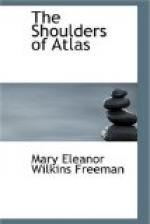“Uncle Henry?” said she, interrogatively, and waited.
Henry looked across at her and smiled with the somewhat abashed tenderness which he always felt for this girl, whose environment had been so very different from his and his wife’s. “Well?” he said.
“Uncle Henry, do you think a man can tell another man’s reasons for doing a queer thing better than a woman can?”
“Perhaps.”
“I almost know a woman could tell why a woman did a queer thing, better than a man could,” said Rose, reflectively. She hesitated a little.
Henry waited, his worn, pleasant face staring at her over a vividly colored page of the paper.
“Suppose,” said Rose, “another woman had given Aunt Sylvia a box of candy which she had made herself, real nice candy, and suppose the woman who had given it to her was lovely, and you had knocked a piece of candy from Aunt Sylvia’s mouth just as she was going to taste it, and had startled her so you made her drop the whole box, and then set your heel hard on the pieces; what would you have done it for?”
The girl’s face wore an expression of the keenest inquiry. Henry looked at her, wrinkling his forehead. “If another woman had given Sylvia a box of candy she had made, and I knocked a piece from her hand just as she was going to taste it, and made her drop the whole box, and had trampled all the rest of the candy underfoot, what should I have done it for?” he repeated.
“Yes.”
Henry looked at her. He heard a door shut up-stairs. “I shouldn’t have done it,” he said.
“But suppose you had done it?”
“I shouldn’t have.”
Rose shrugged her shoulders. “You are horrid, Uncle Henry,” she said.
“But I shouldn’t have done it,” repeated Henry. He heard Horace’s step on the stair. Rose got up and ran out of the room by another door from that which Horace entered. Horace sat down in the chair which Rose had just vacated. He looked pale and worried. The eyes of the two men met. Henry’s eyes asked a question. Horace answered it.
“I am in such a devil of a mess as never man was yet, I believe,” he said.
Henry nodded gravely.
“The worst of it is I can’t tell a living mortal,” Horace said, in a whisper. “I am afraid even to think it.”
At dinner Rose sat with her face averted from Horace. She never spoke once to him. As they rose from the table she made an announcement. “I am going to run over and see Lucy Ayres,” she said. “I am going to tell her an accident happened to my candy, and maybe she will give me some more.”
Henry saw Horace’s face change. “Candy is not good for girls; it spoils their complexion. I have just been reading about it in the Sunday paper,” said Henry. Sylvia unexpectedly proved his ally. Rose had not eaten much dinner, although it had been an especially nice one, and she felt anxious about her.
“I don’t think you ought to eat candy when you have so little appetite for good, wholesome meat and vegetables,” she said.




